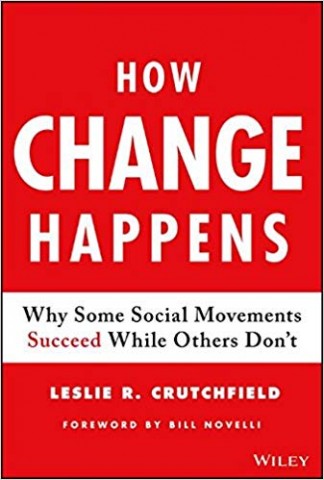Why Some Social Movements Succeed While Others Don't
This is the question that drives the recent book by Leslie Crutchfield, "How Change Happens: Why Some Social Movements Succeed While Others Don't" (2018). This book is about social movements in the US, or that are primarily US-led. It offers some interesting case studies, quite descriptive throughout. The author summarizes the objective as seeking to understand why "some changes occur, but others don't? What are the factors that drive successful social and environmental change campaigns, while others falter? This book examines the leadership approaches, campaign strategies, and ground-level tactics employed by a range of modern social change efforts peaking since the 1980s" (p. 3). The key lessons can be summarized in six points:
- "Winning movements are fueled by energy that materializes from the bottom up." (p. 12)
- Do "the yeoman's work of pushing for improvements at the state and local level, advocating town by town, racking up small wins and building momentum incrementally, rather than going for national change at the start." (p. 12)
- "change public attitudes so people believe the changes they seek are fair and right" (p. 13)
- Put your "egos and organizational identities to the side (if only temporarily) so disparate factions can come together around a common agenda" (p. 13)
- "Businesses can affect major change by altering their employee policies; raising their influential voices in public debates; and leveraging their innovation capabilities, as well as their brands and customer loyalty, for causes" (p. 13)
- "Instead of small handfuls of elites dictating to troops from the top down or an amorphous mob of activists genuflecting for change from the bottom up, the most effective movements find the balance between the "leaderless" and the "leader-led" extremes" (p. 14).
I found the book somewhat repetitive. Given two years had passed since "How Change Happens" (Duncan Green's version) was published, and all the hullabaloo around it, it is odd that the author does not even cite Green's book (same title, same topic). Many of the key concepts this book tried to introduce (e.g. complexity, systems) where already introduced in Green's book. Maybe more disappointing is that Crutchfield does not employ complexity or systems approaches consistently, but rather uses them narrowly and in a specific way. Other findings in this book are reflected in a range of existing books (which are also not cited), such as those on leadership, which includes books that are also specific to the US context. Two relevant omissions were McChrystal (2015) and Bond and Exley (2016). The lack of engagement with all this relevant literature is unfortunate, particularly given the research produced was done by a large team. If you are looking for a book on this topic, I would suggest Green's 'How Change Happens' before this one (unless you are seeking out the specific US case studies).

